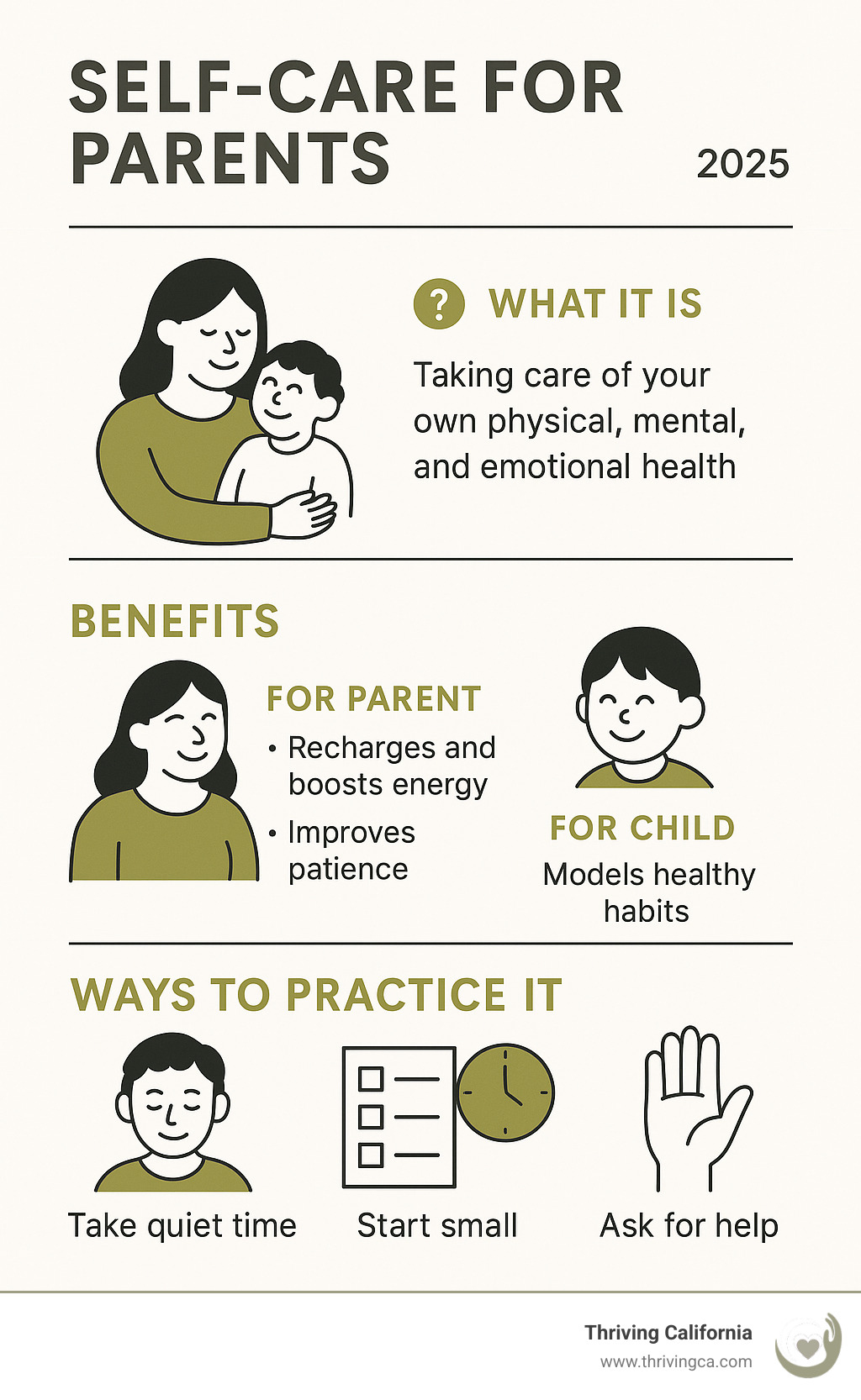Essential Self Care Strategies for Busy Parents: Your Guide to Thriving While Raising Children

Taking care of yourself while raising children aged 0-3 isn't just important—it's essential for your family's health and happiness. When busy parents practice self care consistently, they create a foundation that supports everyone in the household. At Thriving California, our group practice specializes in helping parents develop sustainable healthy habits that work within the realities of family life.
Why Parents Must Make Self Care a Priority
The importance of self care cannot be overstated when you're raising young children. Think about flight attendants who instruct passengers to put on their own oxygen masks first—this principle applies directly to parenting. When you prioritize your own health and take time to recharge, you gain the energy and patience needed to be fully present for your kids.
Many parents forget to focus on themselves, believing that constant sacrifice equals good parenting. However, research shows that parents who practice self care regularly model healthy habits their children learn to adopt. Making yourself a priority isn't selfish—it's one of the most loving things you can do for your family.
Understanding the Real Impact on Your Mental Health
Raising children brings unique challenges that can affect your mental health in profound ways. The constant demands, sleepless nights, and endless responsibilities create stress that accumulates over time. Without adequate self care practices, parents often experience:
Physical exhaustion: Your body needs regular care and attention. When you consistently ignore physical needs, fatigue becomes chronic, affecting every aspect of daily life.
Emotional depletion: Managing stress becomes increasingly difficult without regular restoration. Your mood can shift quickly, patience wears thin, and joy becomes harder to access.
Relationship strain: Whether with your partner, friends, or family members, connections suffer when you're running on empty. Taking care of yourself helps maintain these vital relationships.
Identity confusion: Many parents lose their sense of self while focusing entirely on their kids. Maintaining hobbies and personal interests helps preserve your identity beyond parenthood.
Practical Tips to Start Small and Build Momentum
Beginning a self care practice doesn't require dramatic changes. Here are practical tips and ideas to help busy parents integrate self care into their daily routine:
Morning Moments That Make a Difference
Before the kids wake up, spend time on simple practices that set a positive tone. This might mean enjoying coffee in silence, doing gentle stretches, or taking a hot shower without interruption. Even five minutes of quiet time can shift your entire day.
Write three things you're grateful for in a journal—this simple practice improves mood and perspective. If mornings are too hectic, find another consistent time that works better for your schedule.
Deep Breathing and Mindfulness Throughout Your Day
Deep breathing is one of the most accessible tools for managing stress. When you feel overwhelmed, pause for three deep breaths. This simple act calms your nervous system and helps you respond rather than react to challenging moments with kids.
Practice mindfulness during routine activities. For example, when washing dishes, focus on the warm water and soap bubbles rather than your to do list. These moments of presence create small pockets of peace throughout your day.
Movement and Exercise That Fits Your Life
You don't need a gym membership to stay physically active. Dance with your kids in the living room, take walks with the stroller, or do yoga videos during naptime. Regular movement boosts mood, increases energy, and helps process stress.
Exercise doesn't have to be time consuming. Even 10-minute bursts of activity provide benefits. The key is consistency rather than intensity—find forms of movement you enjoy and can sustain over the long run.
Nourishment and Sleep Strategies
Taking care of your body means prioritizing basic needs like nutrition and sleep. Prepare simple, healthy snacks in advance so you have options when hunger strikes. Keep water bottles accessible throughout your home to stay hydrated.
Sleep may feel impossible with young children, but small improvements matter. Create a calming bedtime routine for yourself, even if it's brief. Talk with your partner about sharing nighttime duties to ensure both of you get adequate rest. Remember, better sleep leads to better parenting.

Building Your Support System
Creating a strong support system is crucial for parental well-being. Connect with other parents who understand your experiences—whether through local groups, online communities, or informal friendships. These connections provide both practical help and emotional validation.
Don't hesitate to ask family members or friends for assistance. Whether it's watching the kids for an hour or bringing a meal, accepting help isn't weakness—it's wisdom. Your community wants to support you; let them.
Consider professional resources as part of your support system. Therapists, parent educators, and other professionals offer valuable guidance during challenging phases of parenthood.
Setting Boundaries to Protect Your Energy
Learning to set boundaries is essential for sustainable self care. This means saying no to commitments that drain you, limiting visits from people who leave you exhausted, and protecting time for activities that restore you.
Setting boundaries with your children is equally important. For example, establishing quiet time each afternoon gives everyone space to rest and recharge. Kids learn valuable lessons about respecting limits and taking care of their own needs when they see you doing the same.
Communicate your boundaries clearly and kindly. Your partner, friends, and family members can't support your self care efforts if they don't understand what you need. Be specific about what helps and what doesn't.
Maintaining Your Identity While Parenting
Remember that you're a whole person, not just a parent. Maintaining connections to pre-parenting interests and developing new ones helps preserve your sense of self. This might mean:
Pursuing hobbies: Even 15 minutes weekly devoted to something you enjoy—reading, crafting, gardening—makes a difference. Adapt hobbies to fit your current life rather than abandoning them entirely.
Staying connected: Make time to talk with friends about topics beyond parenting. These conversations remind you of other dimensions of yourself and provide mental stimulation.
Personal growth: Continue learning and growing through podcasts during commutes, online courses during naptime, or books before bed. Feeding your mind supports overall well-being.
Creative expression: Write in a journal, draw, play music, or engage in any creative outlet that speaks to you. Creative activities provide emotional release and personal fulfillment.

Making Time Without Feeling Guilty
Many parents struggle with guilt when they spend time on themselves. Remember that self care benefits your entire family. When you're restored and balanced, you become more patient, creative, and emotionally available.
Start by claiming small pockets of free time—15 minutes here, 30 minutes there. Use this time intentionally for activities that truly restore you. Some ideas include:
- Taking a walk alone to clear your mind
- Reading a chapter of a book you enjoy
- Calling a friend who makes you laugh
- Practicing yoga or meditation
- Enjoying a hot shower or bath without rushing
- Listening to music that lifts your mood
Notice how you feel after these breaks. Most parents find they return to their kids with renewed energy and enthusiasm, proving that self care creates positive ripples throughout the family.
When Professional Support Enhances Your Journey
Sometimes, despite your best efforts to practice self care, you need additional support. This is especially true when dealing with pregnancy anxiety, new parenting challenges, relationship difficulties, or birth trauma. At Thriving California, our group practice offers specialized therapeutic support for parents navigating these experiences.
Our Therapeutic Approach for Parents
Our doctoral-level clinicians understand the unique challenges of raising young children. We offer evidence-based approaches tailored specifically for parents:
Psychodynamic Therapy helps you explore how your own upbringing influences your parenting patterns. Understanding these connections often brings relief and opens new possibilities for responding to your children.
Relational Therapy focuses on strengthening vital connections—with your kids, partner, and yourself. This approach recognizes that healing happens within relationships and that improving these connections enhances family life.
Internal Family Systems Therapy provides a framework for understanding different aspects of yourself that emerge during parenthood. Many parents find this helpful for working with conflicting feelings or parts of themselves.
Specialized Birth Trauma Support
For parents who've experienced difficult births, we offer focused Birth Trauma Therapy using Somatic Resourcing and Bilateral Stimulation. This specialized approach helps your body and mind process traumatic birth experiences, typically bringing relief within 3-6 sessions for individuals or 6-12 sessions for couples.
Supporting Couple Relationships
The transition to parenthood significantly impacts couple relationships. Our clinicians, informed by Gottman Method principles, help partners navigate changes that come with raising young children. We focus on improving communication, understanding each other's experiences, and maintaining connection despite parenting demands.
Most couples working with our practice experience meaningful progress within their first year of therapy, developing healthier patterns that support both individual and relationship well-being.
What to Expect When Beginning Therapy
Starting therapy at Thriving California begins with a free 20-minute consultation. This conversation helps us understand your needs and ensures we're well-suited to support you. During this consultation, we discuss your concerns, answer questions, and talk about practical matters like scheduling.
Once therapy begins, you can expect weekly sessions in a supportive environment where you can explore vulnerable aspects of your experience. Your therapist will help you recognize patterns, understand your responses, and develop new ways of relating to yourself and others.
For birth trauma work, we follow a specific structure beginning with your conception and pregnancy story, moving through the birth experience, and addressing the postpartum period. This systematic approach allows thorough processing of your entire experience.
Creating Lasting Change Through Consistent Practice
Sustainable self care isn't about perfection—it's about developing personalized practices that support your well-being within your actual life. What works for one family may not work for another, and your needs will evolve as your children grow.
The goal isn't eliminating all stress from parenting but building resilience and developing healthy coping strategies. When you invest in self care, you model important life skills for your children while ensuring you have emotional resources for responsive parenting.
Moving Forward with Confidence
Every act of self care contributes to your family's overall health and happiness. Whether through daily practices, building support networks, or seeking professional guidance, investing in yourself creates positive change throughout your family system.
At Thriving California, we're committed to supporting parents through the beautiful complexities of early parenthood. Our specialized focus on parents with children aged 0-3 means we deeply understand this developmental stage's particular challenges and opportunities.
If you're experiencing pregnancy anxiety, struggling with new parenting challenges, navigating relationship changes, or healing from birth trauma, professional support can make a meaningful difference. Our therapeutic approaches provide frameworks for understanding and addressing the complex emotions of early parenthood.
For parents ready to prioritize their well-being, we invite you to reach out. Our intake process begins with a complimentary consultation where we discuss your needs and determine how we can best support you. Together, we can work toward the thriving family life you envision.
Remember, practicing self care as a parent isn't a destination but an ongoing journey of tending to your needs so you can show up fully for your family. You deserve support, and seeking it is a powerful act of love—for yourself and your children.
To learn more about our services or schedule your free consultation, visit our website or contact our practice directly. Our team looks forward to supporting you on your journey toward greater well-being and confident parenting in the Napa, Lafayette, and Thousand Oaks areas, as well as throughout California via telehealth.

